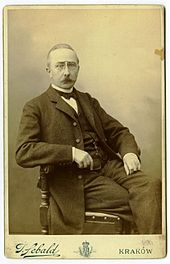August Witkowski
August Wiktor Witkowski (born October 12, 1854 in Brody , † January 12, 1913 in Krakow ) was a Polish experimental physicist. In 1912, after years of effort, he set up the first modern physics laboratory in Poland at the Jagiellonian University in Krakow, where he was also rector in 1910/11.
biography
Witkowski was the son of a banker, went to school in Brody and Lemberg and studied at the Technical University in Lemberg , after which he worked as a geodesist and teacher. He went to Berlin with Gustav Kirchhoff and England to William Thomson on a scholarship . In 1881 he was back in Poland, completed his habilitation and in 1884 became a professor in Lemberg. In 1888 he became a professor in Cracow as the successor to Zygmunt Wróblewski, who died in the same year .
As a physicist, he gained international renown and dealt with the thermodynamics of gases (especially condensation of gases, thermodynamic properties of air, Joule-Thomson effect ), electrical conduction in gases and electromagnetic radiation.
The Witkowski Collegium at the Jagiellonian University is named after him (formerly the seat of physics, then history), as well as a secondary school in Kraków and Jarosław .
In 1892 he was awarded an honorary doctorate from the Jagiellonian University and in 1912 at the Lemberg Polytechnic. In 1910 he received the Order of the Iron Crown, Third Class (but without elevation to the nobility), and posthumously he received the Commander's Cross of the Order Polonia Restituta in 1936 . In 1893 he became a member of the forerunner of the Polska Akademia Umiejętności .
He wrote a three-volume physics textbook that served as training for several generations of Polish physicists.
Web links
Individual evidence
- ↑ Zasady Fizyka (principles of physics), Warsaw, 1892, 2nd edition 1904-1912
| personal data | |
|---|---|
| SURNAME | Witkowski, August |
| ALTERNATIVE NAMES | Witkowski, August Wiktor (full name) |
| BRIEF DESCRIPTION | Polish physicist |
| DATE OF BIRTH | October 12, 1854 |
| PLACE OF BIRTH | Brody (Ukraine) |
| DATE OF DEATH | January 12, 1913 |
| Place of death | Krakow |

